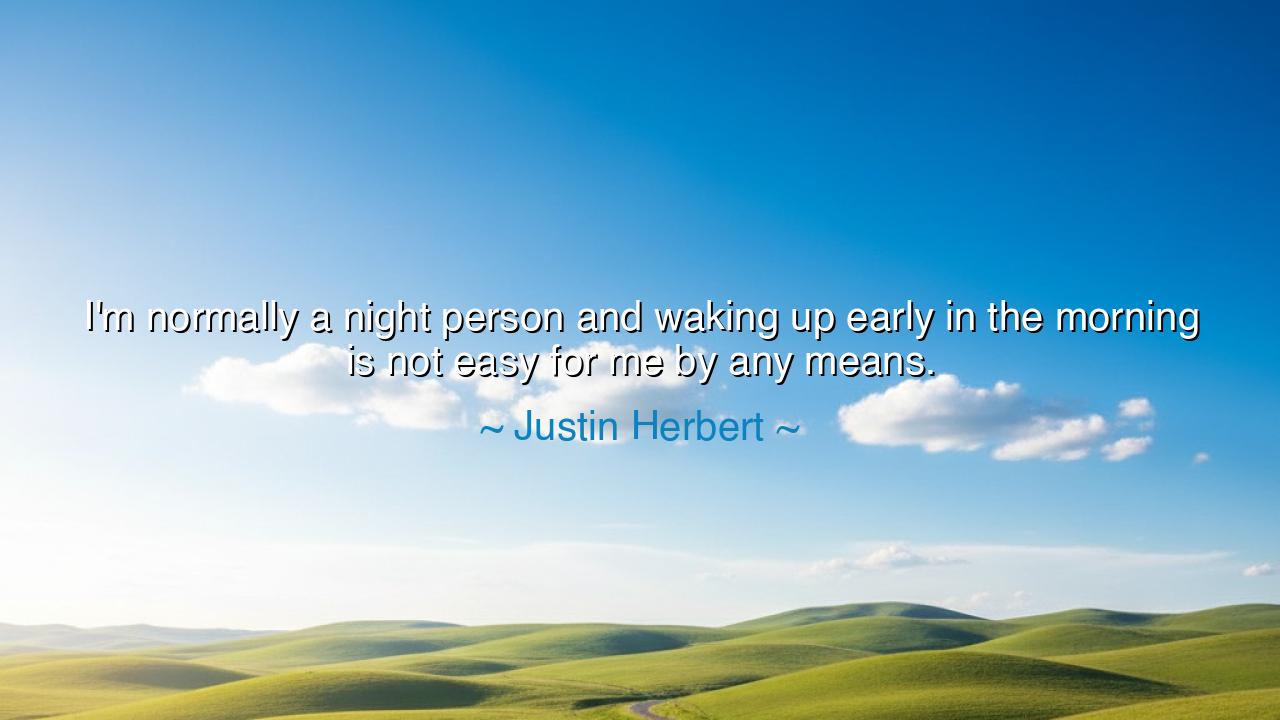
I'm normally a night person and waking up early in the morning
I'm normally a night person and waking up early in the morning is not easy for me by any means.






"I'm normally a night person and waking up early in the morning is not easy for me by any means." These words by Justin Herbert touch upon the universal human experience of grappling with the natural rhythms of the day. Herbert’s reflection is not just about personal preference but a deeper connection to our biological instincts and internal clocks, which are not always aligned with society's expectations. In his admission, there is a recognition that adapting to external demands—like waking up early—is not always a simple act of will, but something that requires effort against the forces of nature itself.
In the ancient world, this struggle would have been understood as part of the larger cosmic order. The Greeks believed that the patterns of the day and night had an influence on human behavior, and many of their philosophers spoke of the importance of understanding the balance between work and rest. The philosopher Aristotle taught that to live a virtuous life, one must find harmony between the intellectual pursuits of the day and the restorative qualities of the night. This balance was part of what he considered eudaimonia, the flourishing of the individual. To Aristotle, sleep and waking were as much a part of our character as our work, and our ability to adjust to the rhythms of nature played a key role in our ability to live in harmony with the world.
Consider the story of Homer’s Odysseus, who, after his long voyage and endless struggles, spent countless nights fighting against fatigue and seeking rest. His journey is a metaphor for the human condition, where exhaustion and resilience are in constant interplay. Despite the trials he faced, Odysseus’ greatness came not only from his strength and wisdom but from his ability to rest when needed, to wake up each day with renewed purpose, and to face each new challenge with courage. Herbert’s struggles with waking up early are reminiscent of Odysseus’ own trials, symbolizing the internal battle we all face against the forces of nature—our bodies and minds pushing back against the structure imposed upon us.
In the modern world, we see this battle against biological rhythms reflected in the lives of countless people who are required to adjust their schedules for work, school, or other commitments. Consider the famous example of Thomas Edison, the inventor who was known for his long hours and reluctance to sleep. Edison often worked late into the night, believing that his productivity was enhanced in the solitude and quiet of the evening. Yet, even Edison, a man of immense creativity and invention, had to learn how to balance his nightly work with the need for rest to continue his innovations. In this way, Edison’s experience reflects a modern parallel to Herbert’s admission—that the struggle to balance our internal desires with the external demands of the world is not only personal but universal.
The lesson here is both simple and profound: our natural rhythms often run counter to the expectations placed upon us by society, yet we must find ways to adapt and thrive within these structures. Just as Herbert acknowledges his struggle with early mornings, many of us face similar battles between the demands of work and the desires of our bodies. The ancient philosophers would remind us that balance is key, that true growth is found not by ignoring the need for rest or recreation but by understanding when to push and when to pause. Even in the face of adversity, the ability to adapt and embrace the structure of the day is a mark of wisdom.
In our own lives, we must listen to our bodies and find strategies that allow us to live with intention—whether that means adjusting our sleep patterns or embracing the challenges of waking up early. Herbert’s challenge with mornings teaches us that personal growth often requires us to push against our natural inclinations, but it also requires self-compassion, acknowledging that some battles are ongoing and that resilience is built over time. We can take the lesson from ancient wisdom and modern struggle alike: growth requires both effort and rest, and the balance between the two shapes our ability to flourish.
Thus, let us not be discouraged by our natural inclinations, but instead, recognize that the effort to adjust and meet the challenges of each day is part of what defines us. Like the ancient philosophers who balanced mind and body, like Edison who worked into the night, and like Herbert who continues to struggle with mornings, we must accept that growth is often uncomfortable, but it is through this discomfort that we build the strength to face the world with purpose. Each day, whether we struggle or succeed, we continue the journey toward balance and understanding.






AAdministratorAdministrator
Welcome, honored guests. Please leave a comment, we will respond soon